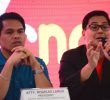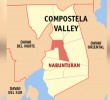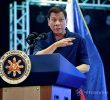Following up our discussion on the relevance of Nationalism as antidote to pervasive corruption in Philippine society, my friend Lito pursues this remark;
“Unsaon kaha pagka epektibo aning imong giresetang antibayotik nga idyolohiya batok sa korapsiyon no? Nga sulod sa dugayng panahon milanang na man ning sakita sa atong sistemang pangpulitika? Di man sad ta kaingon nga wala gyuy kaamgohang makinasudnon ang atong mga lider nga nagmando sa atong nasod sukad pa kaniadto. . .?”
[I’m just wondering how your prescribed ideolopical antibiotic to combat corruption can be effective when for a long time this social illness has deeply metastasized in our political system? We cannot also say that none of our leaders had ever possessed some nationalistic consciousness since they started to rule our country…?]
“Mosakay ko anang imong punto nga duna ra puy pipila sa atong mga nasudnong lider ang naghupot og makinasudnong panglantaw. Tinuod na, kay duna man tay nailhan nga Claro M. Recto, Lorenzo Tanada, Jose W Diokno nga nagpakayab sa bandilang Nasyonalismo sa ilang pangatungdanan niadtong ilang panahon. Pero, ang kuwestiyon mao ni: Napuslan ba ang ilang makilungsodnong pakabana sa paglatid og nasudnong palisiya sa panggobyerno?”
[I’ll follow your point that there had been a few among our national leaders who possessed nationalist consciousness. That’s true. We acknowledge and recognize a Claro M Recto, a Lorenzo M Tanada, and a Jose W Diokno who bannered Nationalism during their respective incumbencies as public officials. But the question is: Have their nationalist concerns been translated into national policies of governance?]
No Sir, their voices, if at all heard, were drowned by the tidal surge of reactionary policies representing the interests of the U.S. imperialists, landlords and comprador-capitalists in the country. It is however noteworthy that these three stalwart statesmen in Philippine politics have manifested anti-imperialist sentiments which gave inestimable measure of inspiration to the patriotic youths in the 1960s and 70s. As a matter of fact, the illustrious Senator Claro M Recto as well as the late Senator Lorenzo Tanada, in separate instances, had made their respective presidential bids in national elections. But they lost due to the maneuvers of the ruling classes led by US imperialism.
Much of the shortcomings of the nationalist political figures in blueprinting the adoption of Nationalism as the ideology of governance point to the overwhelming subjective force of reactionary politicians under the patronage system established as the cornerstone of the malformed state culture bequeathed by colonial politics. As already pointed out, this provides fertile soil for pervasive corruption to flourish.
Still, there is doubt if the Nationalism of these nationalist politicians, had any of them become Chief Executive, could have empowered the people to pursue societal change as a sustainable program to buttress their own social reform agenda. Granting any of them would have become president, could he have outwitted and outlived the politically dominant reactionary politicians? And above all, would US imperialism have been benign enough as to allow him to proceed thorough agrarian reform and nationalist industrialization?
His own position in power would have been very tenuous and shaky. And only the support of a highly politicized and empowered masses of the population could have provided the impetus for a successful social transformation. In any undertaking for societal reconstruction, it will always be the organized and empowered masses who will constitute the motive forces.
People Empowerment is the name of the game for which Nationalism is its ideological sustenance. The masses of the people must realize that the Nationalist ideology is the only veritable weapon for their empowerment and emancipation.
But let there be no misconceptions! The reactionary politicians have always been mouthing empty rhetorics on people empowerment. They introduce projects such as hog-raising or scholarship programs and call them programs of people empowerment. How they happened to be called “people empowering devices” can only ensue from the absurdity of the reactionary politicians’ logic of deception and cajolery.
A program of genuine people’s empowerment does not consist in one or two—or at most, a few—individuals having been raised into a well-to-do standing in the community. This only engenders selfish individualism which is anathema to Nationalism. There can only be genuine people empowerment when the people consciously engage in participatory and/or collective endeavor as an integral part of the over-all long-term goal of emancipating the entire nation from the scourges of poverty and underdevelopment. The tall order and desired ends of people empowerment do not countenance individualized self-enrichment. It defeats the egalitarian principle of Nationalism which chiefly aims for the attainment of development and progress.
In face of these unfortunate circumstances, the agenda for societal transformation necessitates a massive propaganda program of action. It behooves all nationalists to strive to their utmost energy and mettle to arouse and educate the people by way of a Cultural Revolution. It is the only avenue by which the people can empower themselves and take the destiny of the nation in their own hands and not leave it to the hopeless power-greedy interests of the ruling elite politicians.
Under this agenda of a Cultural Revolution, it becomes necessary for masses of the people in the widest range of the social spectrum to be organized and mobilized to action as a way of confronting vital issues in the macro as much as in the micro level of the socio-political arena. The nationalist standpoint should always be the basis of the banner call in crystallizing the concerns and issues necessitating collective actions. In this way, the theory and practice of people empowerment is brought to the ground laboratory of people’s action, thereby concretizing the axiom that the masses and the masses alone are the real makers of history.










